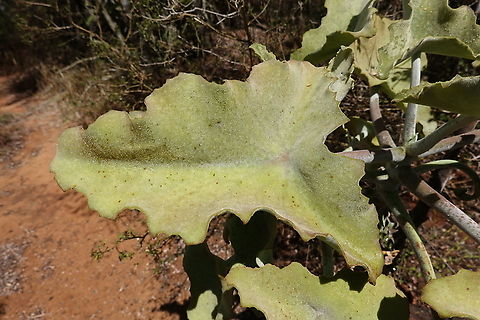
Reproduction
The genus ''Kalanchoe'' may reproduce asexually by producing plantlets on leaf margins, which when distributed on a suitable substrate will form new plants. Plantlet-forming species fall under two categories. The first category is ''induced plantlet-forming species'' that produce plantlets under stress. The second plantlet-forming species is ''constitutive plantlet-forming species'' that spontaneously forms plantlets. Induced plantlet-forming species have the LEC1 gene that allows them to produce seeds, whereas the constitutive plantlet-forming species have a defective LEC1 gene and cannot produce seeds. ''K. beharensis'' produces seeds as well as plantlets."Kalanchoe beharensis risk assessment." ''Pacific Islands Ecosystems at risk.'' 10 Feb. 2005. 5 May 2009 .Defense
''Kalanchoe beharensis'' uses a system of defense, not unique to this plant, termed ''stress-limited defence''. This system involves deterring herbivores before a high stress level ensues causing cracking in the tissue of the plant. High hardness, a structural component of this system, is characterized by tissues with high density. Since the tissues of plants employing this defense system have a high density, the defenses, commonly spines, prickles, thorns and hair, must reside on the surface of the plant. Amorphous silica is found in the defense structures with a microhardness of about 5000 MPa, which is higher than the microhardness of insects, and of mammalian enamel with a microhardness of 3500 MPa. Through research, this defense system is shown to decrease the amount of plant matter eaten by vertebrate herbivores by reducing the size of the bite a herbivore takes, the volume of a bite, or the rate at which biting occurs.References:
Some text fragments are auto parsed from Wikipedia.